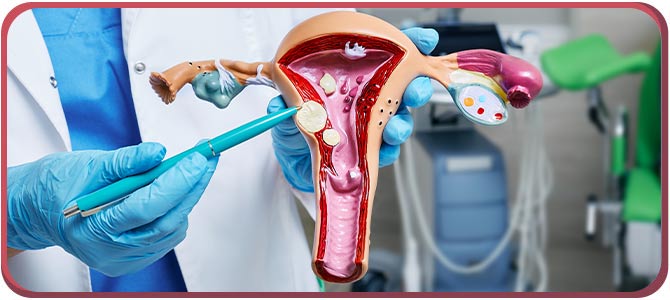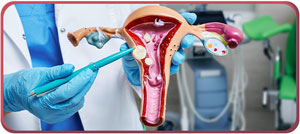What Are Uterine Fibroids? Causes, Symptoms, and Treatment
Uterine fibroids are benign growths that develop within the uterus. These growths can lead to a range of symptoms, including excessive menstrual bleeding, pelvic discomfort, and pressure on nearby organs. Treatment options depend on fibroid size, location, and overall health and symptoms. If you’re experiencing any of these symptoms, consider consulting with Dr. Prema Kothandaraman at the OB-GYN & Incontinence Center for a personalized evaluation. For more information, contact us today or book an appointment online. We have convenient locations to serve you in Arcadia, and Glendale, CA.




Table of Contents:
What are the common symptoms of uterine fibroids?
When should I seek treatment for uterine fibroids?
How are uterine fibroids diagnosed?
Are there lifestyle changes that can help manage fibroid symptoms?
At The OB-Gyn & Incontinence Center, we specialize in diagnosing and treating a wide range of women’s health issues, including uterine fibroids, medically known as leiomyomas. These benign growths of the uterus are common during the childbearing years, and their symptoms can vary widely depending on their size, location within the uterus, and proximity to nearby pelvic organs.
Many of our patients with uterine fibroids report heavy and lengthy menstrual bleeding, sometimes severe enough to lead to anemia. This excessive bleeding may also cause menstrual periods to last longer than a week. In addition, severe pelvic pain and pressure, extending to the back and legs, can be a symptom of uterine fibroids.
Frequent urination is another common complaint among our patients with this condition. This happens when larger fibroids exert pressure on the bladder, leading to frequent bathroom visits and, in some cases, difficulty fully emptying the bladder. This pressure may also cause constipation.
Our team at The OB-Gyn & Incontinence Center is also experienced in dealing with the effects uterine fibroids can have on fertility. These growths can interfere with the implantation of a fertilized egg in the uterus, leading to difficulties in getting pregnant or recurrent miscarriages. Some women may also notice a feeling of fullness or enlargement in the lower abdomen, indicative of larger fibroids.
Pain during sexual intercourse can be another symptom associated with uterine fibroids. In rare cases, a fibroid growing rapidly or during pregnancy could cause acute, severe pain due to the fibroid outgrowing its blood supply and beginning to die.
However, it’s important to note that these symptoms don’t automatically indicate the presence of uterine fibroids. We strongly encourage anyone experiencing these symptoms to schedule an appointment with our medical team for proper diagnosis and treatment.
At The OB-Gyn & Incontinence Center, we specialize in women’s health and reproductive issues, including the diagnosis and treatment of uterine fibroids. While they don’t typically increase the risk of uterine cancer, they can cause several bothersome symptoms that may require medical attention.
As specialists in obstetrics and gynecology, we encourage patients to seek treatment for uterine fibroids if they experience symptoms such as heavy or prolonged menstrual bleeding, pelvic pain, difficulty with bowel movements or frequent urination, difficulty in getting pregnant, abdominal bloating, or painful intercourse.
At The OB-Gyn & Incontinence Center, we understand the impact these symptoms can have on your life. If fibroids are significantly affecting your daily activities, causing discomfort, or raising concerns about future pregnancy, we urge you to reach out to us.
Furthermore, we advise postmenopausal women experiencing abnormal uterine bleeding to seek medical evaluation promptly. Although fibroids usually shrink after menopause, any postmenopausal bleeding should be examined to rule out serious conditions, including cancer.
During the medical history review, our dedicated doctors will inquire about symptoms that may indicate the presence of fibroids, such as menstrual irregularities, pelvic pain, or pressure. We also take into account your reproductive history, including pregnancies, births, and any known hormonal treatments.
The physical examination is another crucial step in the diagnostic process. The initial detection of fibroids often happens during a pelvic exam, where our doctors can gauge the size of your uterus and ovaries, and feel for any irregularities that may suggest fibroids.
At The OB-Gyn & Incontinence Center, we use state-of-the-art imaging tests to detect and measure uterine fibroids. Our main diagnostic tool is ultrasound, which creates images of the uterus using sound waves. Hysterosonography is a procedure that involves injecting sterile saline into the uterus to expand the cavity, enhancing the visualization of uterine fibroids.
MRI and HSG are imaging tests used to diagnose uterine fibroids. MRI offers detailed images of the uterus and surrounding structures, while HSG injects dye into the uterus and fallopian tubes, which are then x-rayed.
Our doctors may also perform a hysteroscopy, using a small, lighted telescope called a hysteroscope, inserted through the vagina and cervix into the uterus. This allows us to detect and measure fibroids directly.
Aside from these, we may order additional tests to rule out other conditions or to assess the severity of the fibroids. These tests may include blood tests to check for conditions like anemia, pelvic inflammatory disease, or thyroid disorders.
Once these tests are complete, our skilled medical professionals can make a diagnosis and discuss the best possible treatment or management strategies for uterine fibroids.
At The OB-Gyn & Incontinence Center, we understand that managing the symptoms of fibroids can be a daunting task. We believe in a comprehensive approach to patient care and recognize the role of lifestyle changes in managing fibroid symptoms. While medical treatment is often necessary, adopting certain lifestyle changes can potentially lessen the severity of fibroid symptoms and improve your overall health and well-being.
Diet:
To effectively manage fibroids, patients should follow a balanced diet containing fruits, vegetables, whole grains, and fiber, while reducing processed foods, alcohol, caffeine, and high-sugar consumption.
Exercise:
At The OB-Gyn & Incontinence Center, we can provide guidance on appropriate physical activities that could help manage fibroid symptoms.
Weight Management:
Weight management is a personalized process that balances hormones and reduces fibroid growth. To help you reach and stay at a healthy weight, we offer expert guidance and assistance.
Other Recommendations:
The OB-Gyn & Incontinence Center emphasizes comprehensive patient care, advising against smoking to reduce fibroids risk. We may discuss using an IUD to reduce heavy bleeding and exploring supplements for anti-inflammatory effects and pain relief.
Lifestyle changes can help manage fibroid symptoms, but they are not a substitute for medical treatment. At The OB-Gyn & Incontinence Center, we offer personalized care and treatment options based on individual needs. Consult with healthcare professionals to determine effective strategies for managing fibroid symptoms. For more information, contact us today or book an appointment online. We have convenient locations to serve you in Arcadia, and Glendale, CA. We serve patients from Arcadia CA, Glendale CA, Monrovia CA, Pasadena CA, Los Angeles CA, Burbank CA, and surrounding areas.


Additional Services You May Need
▸ Urogynecology
▸ Minimally Invasive Gynecology
▸ Monalisa & Medical Aesthetics
▸ Bioidentical Hormone Replacement Therapy
▸ Urinary Incontinence
▸ Pelvic Organ Prolapse
▸ Painful Bladder
▸ Urinary Tract Infection
▸ Genitourinary Syndrome of Menopause
▸ Female Sexual Dysfunction
▸ Urinary Retention
▸ Vaginal Laxity & Prolapse
▸ Postpartum Pelvic Floor Problems
▸ PCOD
▸ Bladder Prolapse Repair
▸ Urgent PC
▸ Fibroids
▸ Excessive Bleeding
▸ Pelvic Pain
▸ Birth Control & IUD
▸ Vaginal & Pelvic Infection
▸ Monalisa Touch
▸ STD
▸ TempsureVitalia
▸ Biote Pellet Therapy
▸ Topical BHRT
▸ Flexsure
▸ Rectal Prolapse Repair
▸ Tempsure ENVI
▸ Minimally Invasive Pelvic Surgery for Incontinence



